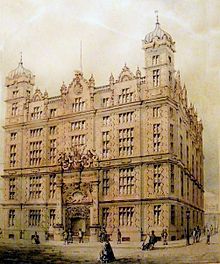
"Maggie May" (or "Maggie Mae") (Roud No. 1757) is a traditional Liverpool folk song about a prostitute who robbed a "homeward bounder", a sailor coming home from a round trip.
John Manifold, in his Penguin Australian Song Book, described it as "A foc'sle song of Liverpool origin apparently, but immensely popular among seamen all over the world".[2] It became widely circulated in a skiffle version from the late 1950s.
In 1964, the composer and lyricist Lionel Bart used the song and its backstory as the basis of a musical set around the Liverpool Docks. The show, also called Maggie May, ran for two years in London. In 1970, a truncated version of the song performed by the Beatles was included on their album Let It Be.
- ^ Cite error: The named reference
hugwas invoked but never defined (see the help page). - ^ "Australian Folk Songs | Maggie May". folkstream.com.